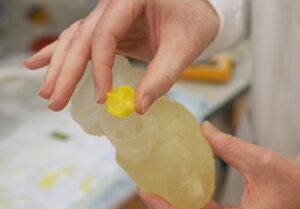Georgia Tech researchers have developed a brand new sort of 3D-printed coronary heart valve designed to advertise pure tissue regeneration. The bioresorbable valve goals to deal with limitations of present substitute choices, which usually final solely 10-15 years. This innovation may notably profit the tens of millions of Individuals affected by coronary heart valve illness, who usually require a number of surgical procedures all through their lives.

The brand new valve is manufactured utilizing poly(glycerol dodecanedioate), a biocompatible materials that may be inserted through catheter. As soon as in place, the valve responds to physique temperature by taking its supposed form and inspiring tissue development. The unique printed construction dissolves inside months, abandoning naturally regenerated valve tissue.
The know-how affords explicit promise for pediatric sufferers, who presently face repeated surgical procedures as they develop. “In pediatrics, one of many greatest challenges is that children develop, and their coronary heart valves change measurement over time,” mentioned Scott Hollister, who holds the Patsy and Alan Dorris Chair in Pediatric Know-how at Georgia Tech.
The challenge combines two current applied sciences – bioresorbable implants and 3D-printed valves – in a novel manner. The analysis crew, led by school members Lakshmi Prasad Dasi and Scott Hollister, centered on creating patient-specific options quite than following the standard one-size-fits-most strategy.
Whereas the innovation reveals potential, important testing stays earlier than the valve can enter medical use. The analysis crew is presently conducting sturdiness exams and simulations that mirror actual coronary heart situations. The challenge has acquired funding from the Nationwide Institutes of Well being and includes a number of researchers engaged on numerous facets of the know-how’s growth.
Supply: analysis.gatech.edu

